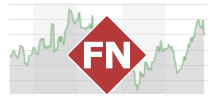BRUSSELS/FRANKFURT/PARIS (dpa-AFX) - The European Central Bank policymakers felt no immediate pressure to adjust interest rates in September as risks to both inflation and growth were seen as balanced and the high uncertainty linked to trade policies also justified the stance as this would give more time to assess the real impact of tariffs on the economy, minutes of the September policy session showed on Thursday.
'The incoming data since the July meeting had confirmed that the inflation outlook continued to be in a good place and that the domestic economy remained resilient, with risks to economic growth now more balanced,' the minutes, which the ECB calls 'account' of the September 10-11 Governing Council session revealed.
The ECB left interest rates unchanged for a second time in September. The bank had cut interest rates by a quarter basis points each in every rate-setting session since September last year.
The still volatile global trade policy environment and geopolitical developments have rendered more than usual uncertainty, and this would justify keeping rates unchanged now, the minutes said.
ECB rate-setters expect the present situation to change materially at some point, but they agreed that the precise time and direction of such change was uncertain.
'Maintaining policy rates at their current levels would allow more time to assess the effects of tariffs, ongoing uncertainties and the other risk factors that the Governing Council had discussed, even if these risks would not all fade away,' the minutes said.
Policymakers also saw the current level of interest rates to be sufficiently robust in managing shocks, given the two-sided inflation risks and taking into account a broad range of possible scenarios.
'Overall, there continued to be a high option value to waiting for more information,' the minutes said.
Meanwhile, several ECB policymakers assessed that inflation could undershoot the target in the medium term. They viewed risks to the inflation outlook as tilted to the downside due to factors such as a strong euro that has been 'a genuinely exogenous shock unrelated to euro area economic conditions' and could have a larger-than-currently-projected impact on inflation.
They also pointed out that further appreciation of the single currency was possible given increasing expectations of interest rates cuts from the U.S. Federal Reserve. Further, trade tensions and uncertainty still posed downside risks to inflation, those members said.
The 0.7 percent growth in the euro area during the first half of the year was driven by a robust recovery in domestic demand, which was partly due to the frontloading of export orders from the U.S. in the wake of the trade tariffs. However, the ECB said a resilient labor market also played a part in supporting growth as the Eurozone economy was operating close to full employment.
'While higher tariffs, a stronger euro and increased global competition were expected to hold growth back for the rest of the year, the effect of these headwinds on growth should fade in 2026,' the minutes said.
'Foreign trade was likely to be a drag on growth for some time, as the effects of higher tariffs and the stronger euro would materialize only gradually,' the report added.
ING economist Carsten Brzeski said the minutes seem to imply that the ECB's willingness to react to a changing macro backdrop is higher than markets think. The firm expects the central bank staying on hold for the next two years.
However, there are still some valid dovish arguments such as the delayed adverse impact of US tariffs, the stronger euro, French political crisis or a delay in Germany's fiscal stimulus, and all these could still force the central bank to cut further over the coming months, the economist said.
'If any of these downside risks still materialize, we can see the ECB engaging in one or two more rate cuts,' Brzeski added.
Earlier in this week, ECB Chief Economist Philip Lane said in speech that an intensification of downside risks could warrant a modest reduction in interest rates.
Meanwhile, ECB President Christine Lagarde said last week that risks to inflation appear to be well contained.
Copyright(c) 2025 RTTNews.com. All Rights Reserved
Copyright RTT News/dpa-AFX
© 2025 AFX News

